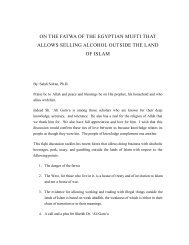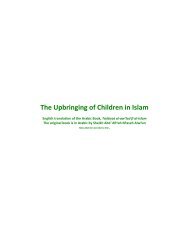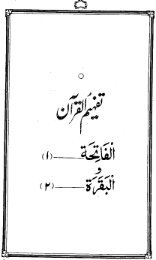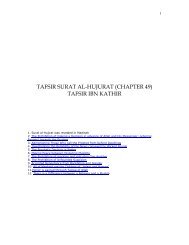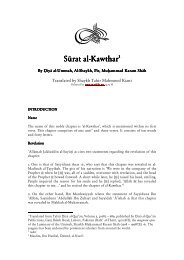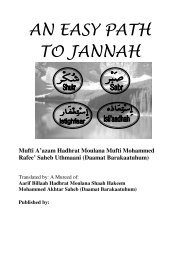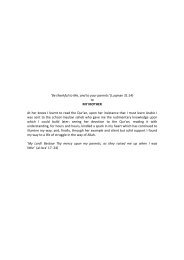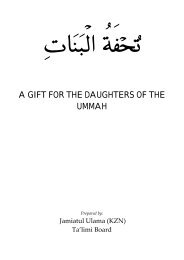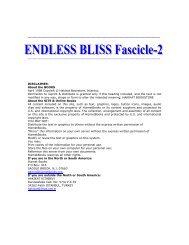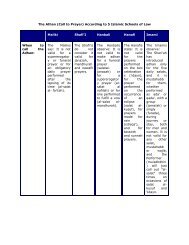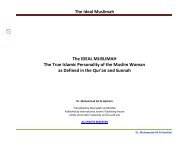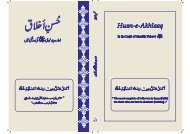Rebellion and Civil Disobedience in Islam The Need for a Paradigm ...
Rebellion and Civil Disobedience in Islam The Need for a Paradigm ...
Rebellion and Civil Disobedience in Islam The Need for a Paradigm ...
You also want an ePaper? Increase the reach of your titles
YUMPU automatically turns print PDFs into web optimized ePapers that Google loves.
enactments of Allah (swt). <strong>The</strong> second group admonished the first group, to freethemselves from blame <strong>and</strong> guilt be<strong>for</strong>e Allah (swt) <strong>and</strong> <strong>in</strong> an attempt to guide theevildoers back to the path of Allah (swt). <strong>The</strong> third group did not participate with the firstgroup <strong>in</strong> their transgression but, at the same time, they did not advise them. People of thethird group were astonished at the second group <strong>and</strong> asked them about the usefulness ofpreach<strong>in</strong>g a people whom Allah (swt) was about to destroy or punish with an awfuldoom. <strong>The</strong> preachers replied that they were discharg<strong>in</strong>g their duty of <strong>for</strong>bidd<strong>in</strong>g the evil<strong>and</strong> that there might be a chance that the <strong>in</strong>iquitous people would fear Him (swt) <strong>and</strong> stoptheir <strong>in</strong>fraction. Verse (7:165) expounds what happened next. It is only those who<strong>for</strong>bade evil that were rescued. Punishment befell the profligates <strong>and</strong> those who failed to<strong>for</strong>bid the evil 11 .In (11:113) 12 , Muslims are warned aga<strong>in</strong>st <strong>in</strong>cl<strong>in</strong>ation to the unjust. This verse isevident <strong>in</strong> <strong>for</strong>bidd<strong>in</strong>g any type of aid that helps the unjust to entrench his tyranny <strong>and</strong>corruption. In fact, <strong>in</strong> (22:39) 13 , Muslims are permitted to fight to reverse the <strong>in</strong>justicethat has befallen them. <strong>The</strong> verse (4:75) has the same purport: “And why should you notfight <strong>in</strong> the cause of Allah <strong>and</strong> of those who, be<strong>in</strong>g weak, are ill-treated (<strong>and</strong> oppressed)?Men, women, <strong>and</strong> children, whose cry is: "Our Lord! Rescue us from this town, whosepeople are oppressors; <strong>and</strong> raise <strong>for</strong> us from You one who will protect; <strong>and</strong> raise <strong>for</strong> usfrom You one who will help!”To summarize, the ma<strong>in</strong> lessons from all these Quranic verses are:1) <strong>The</strong> paramount importance of realiz<strong>in</strong>g justice without any sort of discrim<strong>in</strong>ation.2) <strong>The</strong> utmost importance of enjo<strong>in</strong><strong>in</strong>g the good <strong>and</strong> <strong>for</strong>bidd<strong>in</strong>g the evil.3) Muslims should do whatever possible to elim<strong>in</strong>ate <strong>in</strong>justice.4) Failure to <strong>for</strong>bid the evil is tantamount to <strong>in</strong>dulg<strong>in</strong>g <strong>in</strong> it <strong>and</strong>, thus, makes one liable toa severe punishment from Allah (swt).If we move to the Sunnah of the beloved Prophet (saw), we f<strong>in</strong>d him (saw) say<strong>in</strong>g:1) “<strong>The</strong> best <strong>for</strong>m of Jihad is a word of truth spoken be<strong>for</strong>e an unjust ruler.”2) “<strong>The</strong> master of martyrs is Hamza <strong>and</strong> a man who stood be<strong>for</strong>e an unjust ruler enjo<strong>in</strong><strong>in</strong>gthe good <strong>and</strong> <strong>for</strong>bidd<strong>in</strong>g the evil <strong>and</strong> was consequently killed.”3) “If Muslims see an unjust man <strong>and</strong> fail to resist him, Allah (swt) will overwhelm themwith punishment.”perchance they may fear Him.’ So when they neglected what they had been rem<strong>in</strong>ded of, We deliveredthose who <strong>for</strong>bade evil <strong>and</strong> We overtook those who were unjust with an evil chastisement because theytransgressed.”11 Many commentators do not adopt this exegesis. <strong>The</strong>y argue that the people of the third group were saved.My reply to this is that the exposition given here is more compatible with the manifest mean<strong>in</strong>g (zahir alnass)of the verse <strong>and</strong> pursuant to verse (5:79), “Nor did they <strong>for</strong>bid one another the <strong>in</strong>iquities which theycommitted: evil <strong>in</strong>deed were the deeds which they did.” Allah (swt) castigates those who do not dischargetheir obligation of <strong>for</strong>bidd<strong>in</strong>g the evil. And Allah (swt) knows best.12 “And <strong>in</strong>cl<strong>in</strong>e not to those who do <strong>in</strong>justice, or the Fire will seize you; <strong>and</strong> you have no protectors otherthan Allah, nor shall you be helped.”13 “To those aga<strong>in</strong>st whom war is made, permission is given to fight, because they are wronged; <strong>and</strong> verily,Allah is Most Powerful <strong>for</strong> their aid.”7



